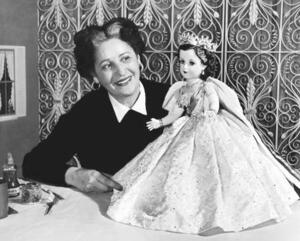Channeling Madame Alexander's Philanthropic Charge
I hold a loving and, at times, resentful relationship to my childhood dolls.
Once animated by false ideals of femininity and my story-loving personality, my Barbies have been laid to indefinite rest in a box deep in my closet, in their pink dresses and disproportionate bodies contrived to the male gaze; shrouded in nostalgia and shame.
My feminist identity has changed how I relate to these figurines. Nonetheless, so has learning about Madame Alexander, the exuberant, brilliant Jewish woman behind America’s first successful doll. Today, while the remaining owners of these ornate figurines may seldom enjoy them as toys, these dolls still unlock the unique history and prosperity that backdrops one of America’s most powerful Jewish philanthropic activists.
Beatrice Alexander, born to an immigrant family in 1895, developed her affinity for dolls during stretches of time spent in her father’s doll repair shop as a girl. The immense pride he took in his craft translated to her, and the young Beatrice Alexander was imbued with the importance of dolls to children’s imaginations and education. Alexander carried this intention with her into 1923, when she founded the Madame Alexander Doll Company.
Since the company’s inception, Madame Alexander has created 5,000 variations of dolls that remain on permanent display at cultural institutions across the world. Madame Alexander prioritized the educational value of her toys over their aesthetics. Her collections were inspired by literature, film, and society, featuring historical figures, fictional characters, and relevant starlets in entertainment (including a collection of dolls inspired by Little Women). At one point, the company was the largest doll producer in America.
Running an independent business was a bold step for women in the 1920s; Madame Alexander’s determination was a testament to her self-empowerment despite the prevailing, and oftentimes suffocating, sentiment that women were better off confined to the domestic space.
To stay ahead of her industry, Madame Alexander pursued an unconventional market strategy. Inspired by her personal rise in industry (made possible only by her outright rejection of conventional gender roles), Madame Alexander assumed a progressive stance on the relationship between gender and dolls for her time; she spoke out against the idea that boys couldn’t play with dolls. In her mind, dolls could foster a boy’s nurturing instincts, enabling them to better fulfill parenting roles so they would not later partake in the social pressure to desist from child-rearing.
In the 1920s, philanthropy was on the list of women's domestic responsibilities that, like most things, was puppeteered by men. Madame Alexander’s engagement with charity was unique—she invested her own money, not a husband’s, affording herself complete ownership in her process. As a daughter of immigrants and Zionists, Madame Alexander chose to fund her roots, supporting Jewish organizations dedicated to improving relations in the United States and bringing into reality the dream to establish a Jewish state. Based in New York, Madame Alexander also prioritized keeping her entire operation based in Harlem to enhance the local economy over capitulating to the temptation of cheaper foreign labor rates. She gave to public initiatives in Harlem to honor the diverse legacy and needs of the neighborhood as a reflection of gratitude towards and awareness of its local community.
Madame Alexander’s strategy of philanthropy reflects the most successful techniques of philanthropic activism. When we look into our communities to understand where lies the greatest need and subsequently prioritize the people right around us, we can make the deepest difference. We are most familiar with the unique obstacles inhibiting this population.
As Jews, on top of a responsibility to our immediate communities, we balance a unique charge to support our Jewish community to the highest degree alongside our other philanthropic endeavors. In the parts of the Jewish community where supporting groups wider than our shtetls is considered a linchpin of modern tikkun olam, it increasingly becomes a question of choosing between secular and Jewish charities. This is a deeper tension facing Diaspora Jewry: balancing the particularist needs of the Jewish community while embracing the universalism that comes with a liberal society by prioritizing the common good.
I look at my pluralistic Jewish school that enrolls non-Jewish students as a paradigm of this quandary. Upholding tikkun olam as a broad access point into Judaism, my school relentlessly advertises a strong social justice bend to relate how we engage with Judaism best to an outside world. We live in a Jewish community with need, but our social justice often prioritizes removed need. The difference we can make in a four hour period twice a year remotely is limited. Beach clean-ups 40 miles away are important, but there are needs in our immediate community that go unaddressed because we choose to focus on isolated opportunities for tikkun olam that require minimal physical and emotional investment. This is the fallacy of universalism.
Poverty in our closest communities is inadvertently overlooked because we’ve normalized it, numbing ourselves to everyday atrocities. However, choosing to engage in social justice actions that are limited to a removed community, where the expectations are lower and the work is easier, is contrary to the philanthropic principles for which Madame Alexander stood. Our lives don’t take place in the confined utopia of a dollhouse, thus we mustn't focus on remote needs in lieu of those right here. The answer to effective philanthropy in our own community means tuning in, open-eared, to the tangible gaps in our society and seeking justice for those most vulnerable.
As Jews, it’s even greater: Our synagogues, schools, camps, and youth groups reckon with the question of the continuity of our young people daily. Keeping future generations invested in Jewish culture and ancestral heritage means a conscious support of organizations doing this work. Simultaneously, included in our Jewish philanthropic responsibility is advocating for the needs of our elderly, the downtrodden among us, and Israel, with its imperfections. In an age of cheapened messaging around social justice, we are charged with surpassing the temptation to limit the causes to which we are loyal. Movements face overwhelming tasks, so a mindset that involves pidgeonholing oneself into just one issue is rightly tempting.
During the emergence of modern Zionism and the Harlem Renaissance, Madame Alexander retained loyalty to American Jewry, a connection to Israel, and a devotion to Harlem, recognizing that the intersection of communities was central to her upbringing and success in her career. Later on, as she used philanthropy for activism, Madame Alexander didn't turn away from any facet of her background. Her work serves as a reminder to Jewish activists and philanthropists that investing in what directly affects those closest to us, because of our identities and because of our geographic location, invites us to make an evermore meaningful impact.
This piece was written as part of JWA’s Rising Voices Fellowship.






